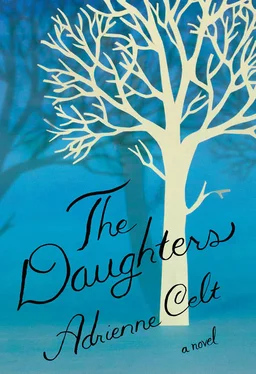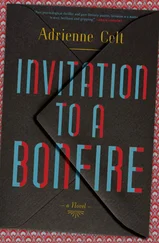We were walking along Lake Michigan, summer wilting the grateful city around us. I wore a pink dress, my favorite color when I was eight, and sandals that left white lines on my feet through the tan, as if I’d been born palomino. It had been more than a year since I saw my mother sing at the Green Mill, and in that time I’d developed a sense that my opinions were powerful and important. At school a girl I despised had announced that her favorite color was pink too, and I took her aside at recess and talked to her using my sweetest tones. She leaned closer to me with every word, and by the time the bell rang her new favorite color was gray.
In Edgewater, a few blocks from the lakeshore, there’s a grand pink hotel, wedged like a slice of cake. We never went inside, but that summer I insisted on taking our walks up north so I could watch the water glint off the windows. I was waiting for an opportunity to get closer to the ground-floor doors; I imagined finding one mysteriously open and slipping through without Ada noticing. Inside would be a society of magicians who would recognize me as one of their own by examining some insubstantial element of me. The color of my bones. The weight of my lungs. I’d run through the empty hallways, waited on by eager and animate pushcarts, brooms, and pieces of cutlery.
But we never got close enough. Instead we crossed Sheridan, maneuvering around a complicated freeway exit, and then strolled along the large, cracked concrete stairs that border the lake.
“They were good boys.” Ada held my hand and stared out into the waves, which smelled like bathwater and diesel. Farther down the shoreline lay a beach dotted with towels and studded with white lifeguard chairs. “Did what their mother asked, mostly. And loved her very much. Very deeply. They were her champions.”
“What were their special gifts?” I hopped carefully over the seams in the concrete. If I was going to be denied my hotel, I wasn’t going to miss out on the best part of the story. “You said they had gifts.”
“Well, lalka .” She didn’t shift her gaze. “They were spirits of the forest. They could disappear into the trees, camouflage themselves in leaves. That kind of thing. Just for starters. But they each had a particular talent. A gift, as you say.
“Andrzej could hear footsteps from twenty miles away. Sometimes we would be sitting on the porch talking and he would tilt his head to the side”—she cocked her ear towards the water—“like this. As though someone were whispering something to him. He could tell the direction a person was walking, and the weight of their body, and even what kind of mood they were in just by the sound of their feet on the earth. Smak smak , if you were angry; flek flek , if you had something to hide. Anyone else would make themselves crazy trying to hear what he heard. But Andrzej didn’t even have to try. Listening came to him as naturally as a heartbeat.
“Fil was shiftier.” She smiled. “He could smell anything, taste anything. He’d have made a wonderful knight to a king, because he could have detected poisoned food without even having to take a bite. It made him a fussy eater. But it was useful.”
“How?”
“Planting, for one thing.” Ada squeezed my hand. “He could always smell water in the ground. And his father, Saul, of course, was a woodsman — he cut down trees to make his living. Saul was already very clever at picking out which trees to cut, to harvest, but Fil could smell an infestation of ants. He could smell a bird’s nest in the top branches of an oak and would climb up to pick it out before the tree was felled. The thing about Fil, though, was that he was always looking to play a trick. If he wrinkled his nose and you asked him what he smelled, you had to be ready for him to say it was you.”
We walked along the steps for a ways, coming close enough to the beach that I could hear the jingle bells of an ice cream truck. “C major,” I said, not to anyone in particular. “What about Konrad?”
Ada stopped at the edge of the concrete stairs, where a series of smaller steps led down into the sand. At the lake’s edge, a group of children were throwing buckets of water at one another and shrieking with laughter. For a moment I felt a tug behind my navel. I wanted to run down the steps and onto the beach, letting the dirty sand get in my shoes. I would head straight for the water and dive in, soak my dress, float on my back, and look at the sky. But Ada’s fingers were still interwoven with my own.
“Konrad was a beacon,” she said finally. “He called things to himself.”
I stared at the gang of children. “What kind of things?”
Ada blinked in the sun.
“Light. Animals. If Konrad sat still, he would be surrounded by birds. They fluttered out of the trees and landed all over him — on his shoulders, in his hair, on top of his feet. And he called rabbits. Not”—she looked pointedly at me—“by shouting or whistling. Not anything like that. I mean they came to him. First the smallest creatures, but then larger ones too. Once Greta walked into the woods at the edge of our land, looking for Konrad. She wanted to bring him in to dinner. And she didn’t see him in the first clearing, so she went a little farther, and then ahead of her there came a sound. A rumble. A growl. On the path stood a bear the size of a house, and right next to it stood Konrad. His fingers were wound up in the bear’s fur, and the bear’s eyes were closed. It was, well, purring.
“Greta ran towards her son, and the bear’s eyes snapped open. The three of them looked at each other for a long moment. Then Konrad whispered something to the bear and scampered into his mother’s arms. Greta watched the creature lumber away, but it never turned around.”
We ourselves turned to walk back the way we’d come. I stole a last glimpse at the children over my shoulder, as they played on the beach, sunburned across their noses. Loud and ordinary, not one of them looked up at me, content as they already were with one another.
The one thing Greta didn’t have in her family of strong sons was a creature of songs. That is to say, a creature like herself. She had never minded living apart in her small town, hearing the whispers of those who said she was a witch, a water spirit. That the songs she hummed everywhere she went would draw men to her so she could drain them of life.
But after the dance at the piano factory, she couldn’t shake the memory of the girl she’d held there — a child who had blinked into existence to the tune of a piano. And then blinked back out again, disappearing with the gray man to who knew where. Greta loved her sons, but when she held them she could feel the girl’s absence.
She hated being alone in her own home. Saul was a gently giant man, hunched over at the table as he ate his soup, back bent in the woods to avoid hitting his forehead against low-hanging branches. But with his softness came his silence. He regarded his wife with an always-quiet admiration and never got caught up in her humming. In fact, he seemed not to hear it at all: the rhythms, the buzzing, the vibrations in her throat were as nothing to him. They were too insubstantial. He loved her for her weight and heft and hands.
The boys ran relays around their home. They pitched war games and threw mud balls and called up storm clouds and held congress with foxes and elk. Saul dragged trees down and planed off their rigid bark, and the boys queried wood larks, teased the nanny goats in the yard. Inside, Greta baked bread, and to herself she hummed. She took pride in her household and family, but she knew deep down that there was something missing from it, without which she would never be satisfied. Behind the cottage was a small plot of land fenced off near the trees to protect it from wildlife. The grass was so green it was practically purple, and dabbed here and there were spots of white, which, from a distance, could easily have been flower bushes. Saul carved each slim cross himself, after the wood was consecrated by the church.
Читать дальше












